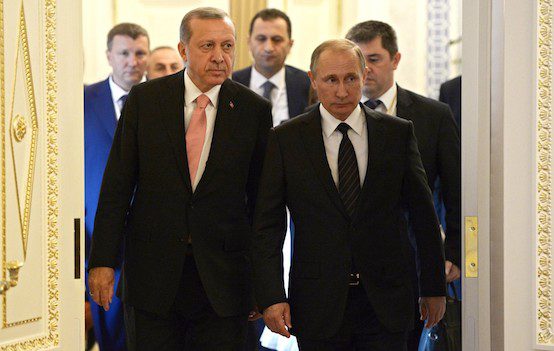America Prime No Longer: In Syria, Regional Powers Step Up

An attack in the northwestern Syrian province of Idlib was imminent. Bashar al-Assad’s forces were positioning helicopters close to the frontline, and the U.S. intelligence community had acquired information that the regime was preparing to use chemical weapons if the tens of thousands of rebel fighters there (at least 10,000 of whom were members of U.N.-designated terrorist groups) put up fierce resistance.
But at the last minute, a deal was struck. Addressing reporters after their bilateral meeting, Russian President Vladimir Putin and Turkish President Recep Tayyip Erdogan announced the establishment of a buffer zone between nine and 12 miles that would keep the combatants apart. The more hardline and irreconcilable extremist elements in the zone would be expected to pull out by October 15, and all heavy weapons and tanks in the area would be withdrawn by October 10. The agreement was anything but a permanent solution. Yet it was surely better than the alternative: a massive displacement crisis and a Syrian government offensive that would have likely claimed thousands of lives.
Will the Russian-Turkish accord hold? It’s too early to say (many Syrians are skeptical of Russian intentions to say the least). But what is encouraging is that the war’s external power brokers cooperated on finding some kind of a solution, even if it was only a holding pattern. The larger point couldn’t be more clear: in many situations, it is the regional powers that need to step up and take responsibility for their own affairs.
This is a point that too often gets lost in the foreign policy mainstream of Washington. Neoconservative Republicans and internationalist Democrats on Capitol Hill—of which there are many—simply can’t fathom that the United States shouldn’t respond in some way when bad things are happening around the world. If innocent people are being killed or American competitors stepping into voids with solutions, the U.S. can’t afford to sit on its hands and be complacent. To even suggest such a thing is labeled by this camp as unconscionable, bordering on traitorous—a direct challenge to the idea of America as the indispensable nation. American primacy has been etched into the psyche of Washington’s foreign policy establishment ever since the Berlin Wall was chiseled away by thousands of freedom-loving Germans. And it’s been with us ever since.
Primacy is an addictive drug. The American people, after all, are ambitious: if there’s a problem that needs solving, they want to solve it.
The public, however, are also smart enough to know when something is taking the nation in the wrong direction. Unlike many of the self-obsessed pundits on television who are blind to the reality staring them in the face, the American people learn from history and adapt accordingly. Many have seen the last quarter century of failed wars and wondered whether their leaders have any organizing doctrine under which priorities are drawn up and the nation’s resources are allocated efficiently. Over the years, they’ve been witness to (and have had to pay for) mistake after mistake after mistake, from a wholly counterproductive war in Iraq to a humanitarian intervention in Libya that turned North Africa into a terrorist factory and human smuggling epicenter. They have watched as three presidential administrations have thrown billions upon billions of dollars every month into Afghanistan, a country where tribes, sub-tribes, ethnic factions, Taliban insurgents, unaccountable warlords, American soldiers, overwhelmed Afghan troops, and jihadist groups from A to Z are fighting in a loop with no end in sight.
And they listen to the same foreign policy elites who got it wrong but still call the shots and peddle the same stale idea: that the United States has a moral duty and strategic responsibility to put skin in the game everywhere. If you dare to question their wisdom, you’re branded as an isolationist or an appeaser who hasn’t learned from Neville Chamberlain’s Munich experience.
It is the primacists, however, who haven’t learned the lessons history has to offer. One of those lessons, even if we as Americans are uncomfortable admitting it, is that the United States doesn’t have all the answers. Nor is every crisis around the world worth extensive American investment, whether in blood, dollars, time, or attention. A foreign policy without priorities is going to overextend America’s capacity and resources. In most cases, this overextension will lead to strategic drift, bad decisions that make the crisis even worse, and endless distraction from what truly matters to America’s security interests.
So we should be thankful that the regional powers are stepping up in Syria. True, America wasn’t party to the agreements that have lately been negotiated there. But why does it need to be?
Daniel R. DePetris is a foreign policy analyst, a columnist at Reuters, and a frequent contributor to The American Conservative.